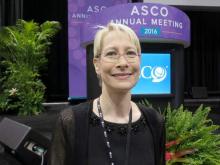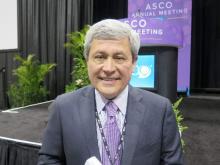CHICAGO – The oral cell cycle inhibitor abemaciclib is active in refractory metastatic breast cancer that is positive for hormone receptors and negative for HER2, according to results of the MONARCH 1 trial.
Nearly a fifth of the 132 women studied experienced a tumor response to this investigational agent on the phase II trial, lead author Dr. Maura N. Dickler of Memorial Sloan Kettering Cancer Center, New York, reported at the annual meeting of the American Society of Clinical Oncology.
“MONARCH 1 confirms single-agent activity of abemaciclib in heavily pretreated patients with hormone receptor–positive, HER2-negative metastatic breast cancer,” she summarized. “The safety and toxicity profile is consistent with previous experience. Twice-daily continuous dosing was feasible, and few patients discontinued treatment due to adverse events.”
“Phase III studies of abemaciclib in combination with endocrine therapies are ongoing,” Dr. Dickler added, referring to MONARCH 2, which is testing the drug in combination with fulvestrant in endocrine-pretreated disease, and MONARCH 3, which is testing the drug in combination with nonsteroidal aromatase inhibitors as initial treatment for metastatic disease.
“This is another piece of evidence that suggests that CDK4 is a very good therapeutic target in breast cancer,” according to session comoderator Dr. Carlos Arteaga, associate director for clinical research and co-leader of the Breast Cancer Research Program at the Vanderbilt-Ingram Cancer Center in Nashville, Tennessee.
The toxicity profile of abemaciclib, an inhibitor of cyclin-dependent kinases (CDK) 4 and 6, differs somewhat from that of palbociclib (Ibrance), a similar agent already approved for combination therapy in this setting, he noted in an interview. Specifically, abemaciclib causes somewhat less neutropenia and more diarrhea, possibly because it has less activity against CDK6 (which also plays a role in hematopoiesis) than against CDK4, while palbociclib inhibits the two kinases equally.
The efficacy seen in the trial “is an encouraging result. I think that it begs the question as to whether in patients who are ER positive, maybe the anti-estrogen can be dispensed with by a drug like abemaciclib. The randomized studies that are ongoing of endocrine therapies, plus-minus abemaciclib, will tell us the answer to that I think,” Dr. Arteaga further commented. “And for patients, this represents, in my opinion, progress because it’s just one more drug, one more therapeutic that we can add to the armamentarium. And in the end, patients will win because the drugs will be equally effective with different toxicity profiles, which may allow us to make deliberate recommendations for one versus the other, or to go from one to the other.”
Last year, the Food and Drug Administration awarded abemaciclib Breakthrough Therapy Designation for the treatment of hormone receptor–positive advanced or metastatic breast cancer on the basis of findings from a phase I trial. This designation is designed to expedite the development and review of drugs that are intended to treat a serious condition and for which preliminary clinical evidence indicates a possible substantial improvement over available therapy on a clinically significant endpoint.
Women with metastatic hormone receptor–positive, HER2-negative breast cancer were eligible for MONARCH 1 if they had received at least two chemotherapy regimens (including one containing a taxane) for their disease and had experienced progression on or after endocrine therapy.
Those enrolled were a heavily pretreated population, having received a median of three prior systemic regimens specifically for metastatic disease and five in total, Dr. Dickler reported. All were treated with abemaciclib (LY2835219) 200 mg twice daily on a continuous basis.
Results of the trial showed that the investigator-assessed overall response rate, reflecting patients with partial or complete response, was 19.7%. “This response rate is similar to that of chemotherapy in a taxane-pretreated patient population,” she noted. Findings were similar when responses were instead assessed by blinded reviewers.
The lower bound of the 95% confidence interval, 13.3%, did not exclude the 15% predefined lower bound that had been set in trial planning, Dr. Dickler acknowledged. At the same time, however, the upper bound was 27.5%.
The clinical benefit rate with abemaciclib, adding to the responders the patients who achieved stable disease for at least 6 months, was 42.4%.
The median time to response was 3.7 months, and the median duration of response was 8.6 months. Ultimately, patients had a median progression-free survival of 6.0 months and a median overall survival of 17.7 months.
The most common grade 3 clinical adverse events were diarrhea (seen in 19.7%) and fatigue (12.9%), while none of the patients experienced grade 4 clinical events.
“Generally, the diarrhea was experienced during the first cycle of treatment and resolved quickly,” Dr. Dickler noted. “It was manageable in the majority of patients, responsive to a temporary suspension of study drug, antidiarrheal agents, and dose reductions for grade 3 events. One patient discontinued study therapy due to diarrhea.”



